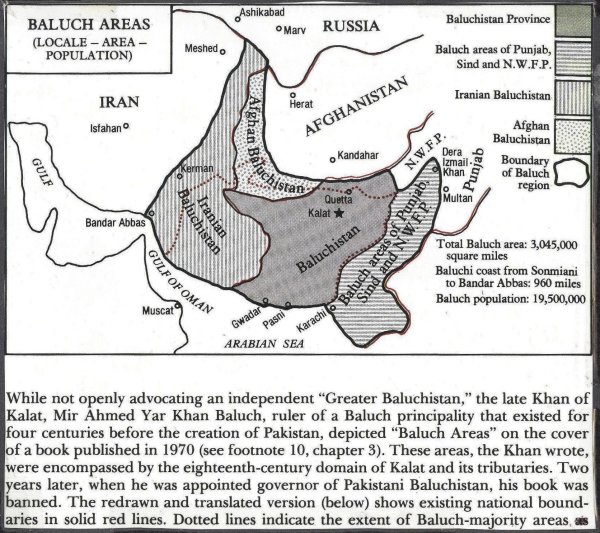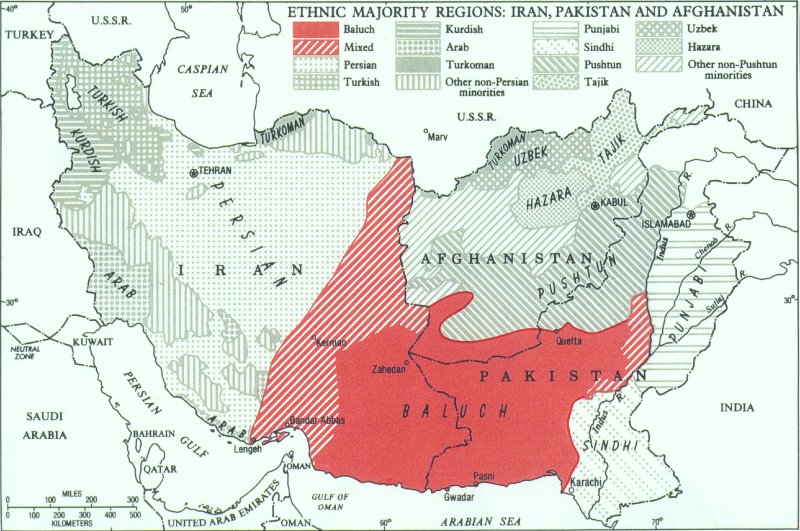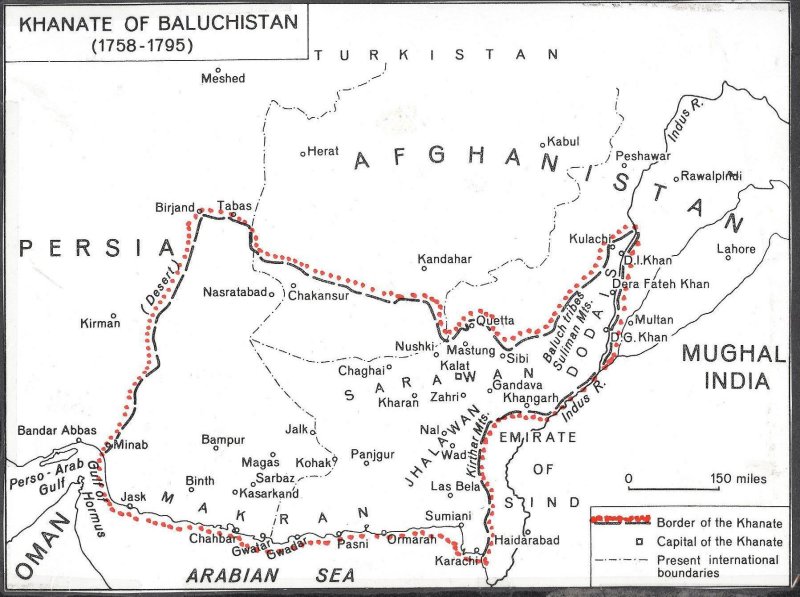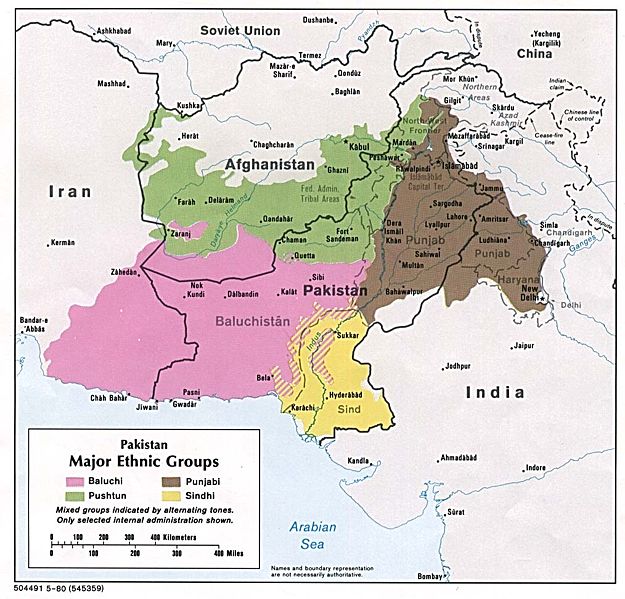Iranian Baluchestan Front
ramana wrote:When did Iran get to grab parts of Kalat?
The British Division of Balochistan and the Incorporation of its Western Part into Iran 1860-1928
This chapter will deal first with the British division of Balochistan in 1871 and then the eventual incorporation of its western part into Iran in 1928. It is a historical analysis of events, which preceded the incorporation of western Balochistan into Iran, beginning with the rise of British colonial hegemony in the region and the ensuing division of Balochistan into western and eastern halves in 1871. This is essential for a better understanding of the present Balochi national movement, which is rooted, in their anti-colonial struggle for reunification of Balochistan. In this regard, the following brief narrative is adopted largely from the official documents found in the British archives as well as the writings of British authorities involved in shaping and implementing those policies. These documents are the only major recorded sources on the internal events in Balochistan during the period between 1860 and 1928
The Anglo-Persian Policies and the Division of Balochistan
Western Balochistan is bounded by the ''Lut ''Desert and the Iranian province of Khorasan in the north, by the Gulf of Oman and the Arabian Sea stretching from the entrance of the Strait of Hormuz to the port of Gwadar on the south and northwest, by the province of Kerman on the west, and by the Goldsmith Line separating Pakistani and Afghani Balochistan on the east. Ethno-geographically it comprises the Jazz Murian agricultural basin in the center and northwest, the Sarhad highlands in the north, the Mashkel lowlands and the Sarawan agricultural oasis on the east, the coastal region of Makuran in the south, and the western-most districts of ''Byaban ''and Bashkard. To this one can add the Helmand Depression inhabited by a mixed ethnic population of Baloch and Seistanis?
Historically, as the original homeland of the Baloch, western Balochistan is the cradle of their past history and the focus of their ancient heroic ballads and popular poetry. It was from here that their ancestors began to spread to, and consolidate their power in eastern Balochistan during the period between the thirteenth and the fifteenth century as mentioned in the previous chapter. The territory was the center of the Rind-Lashari Tribal Confederacy prior to the shift of its power to eastern Balochistan under Amir Chakar Rind in the late fifteenth century. It was also united with the rest of the country under the rule of the khanate of Kalat for the greater part of the eighteenth century.
Upon the death of Nasir khan I, in 1805 and the subsequent deterioration of the central authority in Kalat, the Balochi chieftains (hakims and sardars) of the distant western provinces were the first to succumb to their centrifugal tendencies, which were in turn a function of their tribal/feudal loyalties, and declare their independence. Of these, the most important were the principalities of Dizaks, Pahra (Iranshahr), Bampur, Baho-Dashtiari, Geh, Sarbaz, Kasserkand, and the chieftainates of Sarhard and Bashkard. However, the Narui hereditary rulers of Pahra enjoyed a paramount position among the rulers of these principalities, a position that was held by them until about 1849. At the time of his visit in 1810, Sir Henry Pottinger, a British officer, found western Balochistan independent and the rule of Shah Mehrab Khan Narui acknowledged from Dizak in the southeast to Bazman bordering Kerman in the north. ~2~ In 1839 Haji Abdul Nabi, an Afghan sent by the British to collect intelligence on the political conditions of the country, reported that the Naruis-then under Mohammed Ali Khan were still ruling from Bampur, but observed that Muhammad Shah, the Hakom of Sib, had emerged as the strongest Balochi ruler even though he had no superior position among other chiefs.
Such were the political conditions in western Balochistan in the mid-nineteenth century when Britain began to move into Kalat, then reduced to eastern Balochistan, to establish her forward defense lines against the growing Russian expansion in Central Asia. This objective was accomplished by the Treaty of 1854, which reduced Kalat to a subordinate position by bounding her to abstain from any negotiation with other powers without British consent and gave Britain the right to station troops in whatever part of the country she deemed necessary, as mentioned in the previous chapter. The move was part of an overall strategy to forestall Russian
Southern expansion toward India and the warm waters of the Persian Gulf and Indian Ocean by securing Iran and Afghanistan as buffer states, separating the British Indian Empire from Russia. Consequently, control of Balochistan placed the borders of the Raj as contiguous to Iran and Afghanistan, thus enabling Britain to counter Russian moves in the two countries whose buffer status was regarded as essential to the defense of India. Moreover, Balochistan was also viewed by Britain as a significant line of communication linking India with her bases in the Middle East and Europe.
Historically, the consolidation of British power in eastern Balochistan, which started with the occupation of the Kalat for a short time in 1839, coincides with the beginning of Iranian encroachments on western Balochistan during the reign of Nasir-u-Din Shah (1848-1896) of the Qajar dynasty (1779-1925). In 1849, an Iranian force was sent to punish the Baloch incursions into Kerman, defeating the latter and capturing Bampur, a major Balochi town on the edge of Kerman. The Qajar expansion, however, intensified after the extension of the Indo-European Telegraph Line from Karachi to Gwadar in the domains of Kalat and then up to Jack on the coast of western Balochistan in 1861. By the time the line was completed in 1869-70, Iranian forces had advanced as far as Sarbaz between the coast and Bampur. “These conquests, however, wrote Lord Curzon, the Viceroy and Governor-General of India and a principal architect of the British policies at that time, “testified to no more than the superior might of the victors, while they left a number of bordering Balochi states in a position of semi-dependence, which had no sanction save that dictated by fear.
During the course of the British investigation for the construction of the telegraph line, they were confronted by conflicting territorial claims to western Balochistan by the Shah of Persia, Khan of Kalat, and Sultan of Muscat. At the beginning, the British took a neutral stand by avoiding accepting pretension of sovereignty by any side. On March 11, 1862, the government of India warned the Secretary of State for India that by entering any arrangement with Persia as to the recognition of her claim, “we could not expect those chiefs (Balochi) to look without suspicion at such an engagement between our government and that of Shah, although it does not in terms prevent us from neutrality between themselves and Persia.”
Another official report, dated December 9, 1863 prepared by the British Commissioner Sir Frederick Goldsmith (then a colonel in charge of telegraph negotiation) for the Secretary of State for India in regard to the Persian claims, places the question into historical perspective, thus, given in extensor;
As to her (Persia) right, I know of none but of the strong over the weak, of the prestige of a high sounding monarchy over the obscurity of a small chiefdom. More than one hundred years ago Nadir Shah appointed Nasir Khan Brahui, the Governor of the whole of Balochistan, inclusive of Makuran, and in such capacity he was no doubt to some extent a feudatory of Persia, but it is also more than a hundred years ago that he exchanged the quasi service of the Shah for that of the Afghan King. His allegiance to Kandahar was no less binding than to Persia. It was the allegiance exacted by a stronger arm than his own. When the Afghan monarchy fell to pieces, the service ceased; but Balochistan also fell to pieces, and its chiefs set up claims of independence for themselves... Of late years she has, perhaps been more than usually active in this re-assertion of Makkuran sovereignty. The present state of affairs in Kalat must be especially favorable to her views. Anarchy in that quarter cannot but afford occasion for intrigue, if not for the actual advance of troops. But no new argument will be needed to show that anything like the dismemberment of Kalat would be as advantageous to Persian interests as detrimental to our own.
If possession for a period of years must necessarily imply “acknowledgement by the local rulers” it is the acknowledgement of helplessness. I do not for a moment believe that the Persian yoke is acceptable to the Sardars of Makkuran west of Kalat. (7)~
Subsequently, the British side-stepped the questions of territorial sovereignty and signed separate agreements with the Shah of Persia in 1858, Sultan of Oman in 1865, and the Balochi chiefs of Bahu, Dastiari, Geh, and Jask in 1869. These agreements dealt only with the question of the protection of telegraph wires and stations, and in each case the British undertook to pay a fixed subsidy to the separate parties involved. The agreements with the Baloch chiefs, which are discussed by Mahmud Mahmud, a contemporary Iranian historian, under the heading of relations between the British Government and the savage Balochi tribes, were entered because Persia, in spite of her claims, had no authority in that part of Balochistan and, as such, the British had to negotiate directly with the independent Baloch chiefs as well as to depend on them for the protection of-the telegraph lines and stations.
Moreover, the British were well aware that any acknowledgment as to the Persian claims on their part would have been taken by the independent Balochi chiefs as well as the Khan of Kalat as a sign of Anglo-Persian collaboration and that would have endangered the success of the telegraph negotiations which they had to enter with the Balochi chiefs. Colonel Goldsmith, then serving as Chief Director of the Indo European Telegraph and deputed to Tehran to help negotiate a telegraph treaty, reported to the government of Bombay on October 4,1865, that although there were objections to the plan by Persia on the basis of her demand for an arrangement as to the acceptance of her claims on Britain’s Part, the Baloch opposition constituted the sole obstacle to the scheme. Referring to this difficulty, he stated that;
The sole difficulty that I see in the way, is the discontent likely to be raised among the petty Baloch chiefs on the west of Kalat line, who may look upon themselves as given over to Persia by this arrangement. The point is, no doubt, one of great delicacy, but it is presumed that the question must be met if the telegraph line is to be run eventually through these tracts of country. I cannot but believe that we might come to a satisfactory understanding with the Persians to the effect that up to the long strip of Coast formed by the Imam of Muscat, of which Bunder Abbas is the western extremity, we treat the local chiefs as independent in regard to any subsidy given; but carefully stipulate a policy of non-interference in the general question of sovereignty, in which we neither acknowledge or disown the Persian claim.
Once the telegraph line was completed and its security assured by the Balochi chiefs, the British began to shift their policy of neutrality in favor of Persia. The official explanation was that Persian encroachment was threatening the security of Kalat as a protected state of British India and as such, a settlement with Persia would serve the interests of Kalat as well. Meanwhile, Persia took advantage of the British Presence in western Balochistan to consolidate its conquests as well as to further her expansion in order to enhance her claims and strengthen her bargaining position. It was during this time that Persian troops first advanced as far as Sarbaz and then suddenly the Wazir of Kerman was officially entitled by his sovereign as Sardar of Balochistan around 1866. With the completion of the telegraph line in 1869, the road was paved for an official investigation suggested by Lord Mayo in the same year and the subsequent formation of a joint boundary commission by Persia, Britain, and Kalat was instigated by the Shah in 1870. Consequently, General Goldsmith was appointed as the British Commissioner on the boundary commission.
The commission, however, was not able to hold a joint meeting due to a strong sense of ill feeling displayed toward the Kalat delegate by the Persian commissioner Mirza Ma’sum Khan, who refused to meet with his Baloch counterpart. As a result, General Goldsmith became the sole actor and arbitrator on the issue. In 1871 he received detailed instructions from the Viceroy in Council, who had carefully outlined the limits of a proposed boundary line to be suggested for approval by Persia, but had also added that “a very liberal view may, therefore, be taken of Persian claims to the west of that line. The proposed line was, in turn, based on Goldsmith’s own previous suggestions and reports, which had been prepared in connection with his mission concerning the Makuran telegraph. In one of these reports prepared for the government of Bombay and the Secretary of State for India on April 27,1864, he had underlined the basic historical argument for recognizing the Persian claims as to the latest conquests in western Balochistan. The report stated:
I. That, in my opinion, the claims of Persia to Makkuran generally are based upon somewhat tradition conquests of former years, more or less substantiated by the formal disposal of the province to Mohbut Khan Brahui in the middle of the last century; that the later rise of a new Government and enterprise of a new Chief in Balochistan virtually dispossessed Persia of her never well-defined Makuran territories; but that forcible reassertion of the Shah’s sovereignty over certain parts of Makuran, so for as hitherto carried out, however warrantable in accordance with the rule of European politics, is not a matter with which we can interfere upon a bare principle of justice and equity. In this view, such Makuran territories as Persia now holds in tributes, are hers by mere right of possession.
II That those portions of Makuran obeying the authority of the Khan of Kalat are that chiefs by possession and also by acknowledgement of the local rulers. They are part of an inherited Balochistan state, held, at first, in quasi-feudal tenure from Persia, subsequently from Kandahar, but in reality on a basis of independence, The revolutions which distracted the province after the death of Nasir khan in 1795 can only effect such petty chiefdoms as have been successful in permanently throwing off their allegiance. Those, which revolted and were afterwards subdued, still remain component parts of the inheritance of the Khans.
It is interesting to note how, at the time, the report had equated the claim of Persia to the territory with that of Kalat, a Balochi state, thus leaving the door open for the later recognition of Persian claims. Eventually, the proposed boundary line as sketched by Goldsmith was accepted by Persia and was embodied in a treaty signed between the two sides in September 1871, hence known as the Goldsmith Line separating Eastern and Western Balochistan. At present it forms international boundary between Iran and Pakistan. Reflecting on the ambitions of the Persian empire in western Balochistan and her attitude as to “the small and unknown state of Kalat,” General Goldsmith wrote in the final report of his proceedings to the Secretary of State for India on November 9, 1871, that “these traits, had they power to be independent, would be independent; not having power to be independent, they are as fair prey to the strongest neighbor. (’4) Thereafter, the name “Persian Balochistan replaced “Western Balochistan” in the official colonial documents.
There are several Principal reasons for the aforementioned change in British policy and her decision for the division of Balochistan in favor of~ Persia. The most important was related to the strategic developments in Central Asia at the time. In this regard, the late 1 860s coincided with the rapid Russian expansion toward the Merv in Central Asia as reflected in her conquest of Bokhara in 1866 and of Samarkand in 1869, an event which was particularly alarming to the British strategic interest in South Asia. These developments doubled her resolution to strengthen and defend the buffer status of Persia and Afghanistan against the Russian southward thrusts. Thus, by officiating the Persian claims in western Balochistan, the British helped strengthen her buffer status. In one of his later lectures on Central Asia, Goldsmith has pointed out that since Persia had lost a large portion of her territory to Russia in the north, checked by the Ottoman Empire in the west and by the British in Afghanistan, the only avenue for her expansion was in western Balochistan, where the constant feuds between the petty chiefs had made the land an easy prey to the Persian designs. Second, the British welcomed the Persian advance ~ the territory as a further assistance in pacifying the unruly and independent minded Balochi tribes which were viewed as a constant source of threat to their lines of communication. As we shall see, the British joined hands with Persia in launching several joint expeditions for suppressing the constant tribal revolts in Balochistan throughout the Qajar rule. Third Persian control and pacification of western Balochistan would have prevented the spread of the tribal revolts to the eastern part ruled by the British.
Therefore, the Persian expansion in western Balochistan would not have taken place had it not been for British approval and support. “Persian Balochistan (which) in its present shape,” wrote Lord Curzon in 1892. “Is the creation of the last thirty years, and to a large extent owes its existence to the intervention and the recognition of the British government. Thus, once Persia acquired British recognition of her claims in 1871, she began to extend her power farther in the region by seizing the district of kohak in 1872, expelling the Arabs of Muscat from the port of Chah Bahar, which they had held since 1789, annexing the independent Balochi principality of Bashkard in 1874, and then gradually moving toward Sarhad in northern Balochistan. In spite of these military moves, the Qajar rule in the country was more nominal than real and was directly limited to Bampur, then the capital of Balochistan. The rest of the country remained independent or semi-independent to be disturbed only by periodic military expeditions sent to levy taxes.







